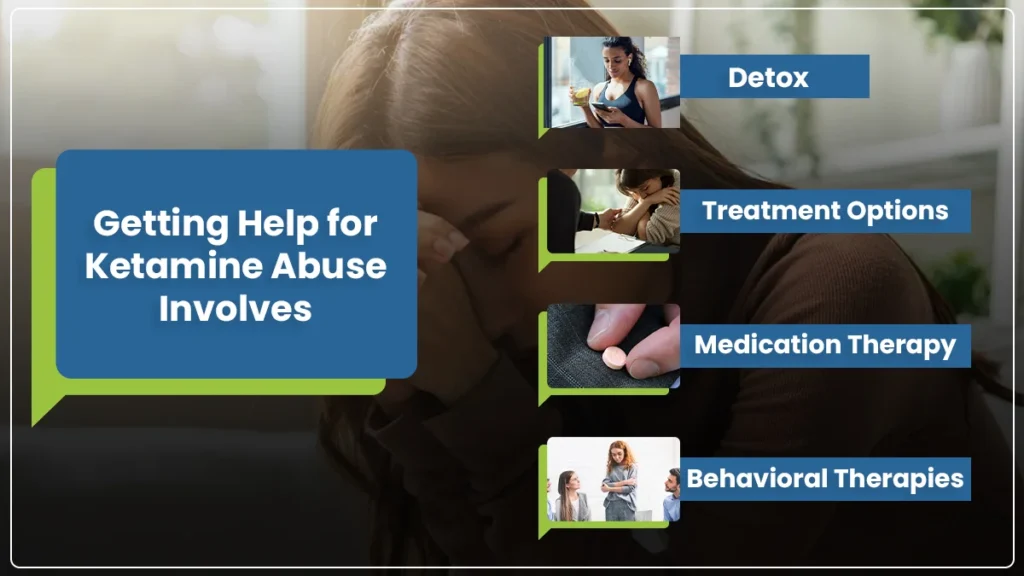Ketamine, primarily known as an anesthetic, is increasingly becoming a reason for concern due to its misuse. Its recreational use for its dissociative effects has raised alarms about potential abuse.
Identifying ketamine abuse involves understanding subtle signs that indicate a person may be struggling with its misuse. These signs extend beyond physical manifestations, delving into behavioral changes and psychological shifts.
As we explore the symptoms of ketamine abuse, it’s crucial to approach this topic with a clear understanding, helping individuals identify red flags and fostering a proactive stance against the growing issue of substance misuse in the United States.
Key Takeaways
Ketamine, primarily known as an anesthetic, is increasingly becoming a reason for concern due to its misuse.
- Distinguishing between ketamine use and abuse requires a nuanced understanding of behavioral patterns.
- Long-term ketamine abuse can lead to persistent physical and mental health challenges.
- Addressing ketamine abuse requires a systematic and supportive approach.
The Haven Detox-New England provides a safe and supportive atmosphere for those on their journey to recovery from substance abuse. Contact us at (844) 933-4145 to explore more about us.

What Is Ketamine and the Rise of Ketamine Misuse
Ketamine, initially a medical anesthetic, is increasingly misused. This trend poses risks in the United States. People seek its dissociative effects, creating detachment from reality.
Ketamine misuse may lead to impaired judgment, hallucinations, and even accidents. Chronic use may harm memory and cognition. Rising popularity in social scenes contributes to its misuse.
The Drug Enforcement Administration (DEA) monitors ketamine due to its potential for abuse. Increased awareness and education are crucial to curb this concerning trend. It’s vital to learn the risks linked with ketamine misuse and promote responsible usage to safeguard public health.
Understanding Ketamine Abuse
Ketamine misuse involves a deviation from its intended medical use. While it’s crucial to recognize that not all ketamine use is abusive, understanding the line between responsible use and abuse is paramount. The recreational appeal of ketamine for its dissociative effects has led to an increase in misuse cases, prompting a closer examination of the psychological symptoms associated with abuse.
Distinguish Use and Abuse
Distinguishing between ketamine use and abuse requires a nuanced understanding of behavioral patterns. Occasional and controlled use for medical purposes may differ significantly from recreational abuse, where individuals engage in excessive and uncontrolled consumption. Recognizing these distinctions is crucial for implementing targeted interventions.
Psychological Symptoms of Abuse
Psychological symptoms of ketamine abuse encompass alterations in mood, cognition, and perception. People may experience dissociation, hallucinations, and a distorted sense of time. Identifying these psychological shifts is pivotal in the early detection of ketamine misuse and facilitating timely interventions.
Effects of Abuse
The immediate effects of ketamine abuse are diverse, ranging from euphoria and sensory distortions to impaired motor function. These short-term impacts underscore the importance of understanding the acute risks associated with ketamine misuse and the need for education on responsible use.
Short-Term Health Effects: Short-term health effects of ketamine abuse extend beyond its psychological impact, including nausea, increased heart rate, and elevated blood pressure. Identifying these signs is essential for individuals and healthcare professionals to address potential health risks promptly.
Impact on Mental Health: Ketamine abuse can have profound implications for mental health, exacerbating symptoms of anxiety and depression. Learning the interconnectedness between substance misuse and mental health is vital for comprehensive intervention strategies.
Long-Term Consequences of Ketamine Abuse
Long-term ketamine abuse can lead to persistent physical and mental health challenges. Chronic misuse may contribute to urinary and gastrointestinal issues, emphasizing the importance of recognizing and addressing the enduring consequences of ketamine abuse.
Impacts on Physical Health: The effects of ketamine abuse on physical health extend beyond immediate effects, potentially causing long-term damage to organs and bodily functions. Awareness of these consequences is crucial for promoting informed decision-making regarding ketamine use.
Impacts on Mental Health: The mental health ramifications of prolonged ketamine abuse can manifest as cognitive impairments, memory loss, and increased vulnerability to psychiatric disorders. Acknowledging these risks is pivotal in fostering a holistic approach to addressing the complexities of ketamine misuse.
Ketamine Dependence
Identifying signs of ketamine dependence involves a comprehensive assessment of both physical and psychological indicators. Understanding these signs is essential for facilitating early intervention and preventing the progression of dependence.
Signs of Physical Dependence
Ketamine dependence involves physical signs:
- Tolerance: People need more ketamine over time to achieve the same effects.
- Withdrawal symptoms: Experiencing discomfort when not using ketamine.
- Increased use: Using ketamine more frequently or in immense amounts.
- Loss of control: Failing to cut down or control ketamine intake.
- Neglecting responsibilities: Prioritizing ketamine use over daily obligations.
- Continued use despite harm: Persisting in ketamine use despite physical or mental health issues.
- Time spent obtaining or using: Devoting significant time to ketamine-related activities.
- Social and recreational sacrifices: Giving up social or recreational pursuits due to ketamine use.
- Desire to quit but unsuccessful: Wanting to stop using ketamine but facing challenges in doing so.
Identifying these signs is vital for healthcare professionals and support networks in tailoring effective strategies. This way, we can address the physiological aspects of dependence.
Signs of Psychological Dependence
Ketamine addiction that involves psychological signs are:
- Cravings: Strong urges or desires to use ketamine.
- Escapism: Using ketamine to avoid or cope with life’s challenges.
- Emotional reliance: Depending on ketamine for mood regulation.
- Anxiety or agitation: Feeling restless or anxious without ketamine.
- Preoccupation: Constantly thinking about using ketamine.
- Distorted priorities: Putting ketamine use above essential life aspects.
- Continued use despite consequences: Ignoring adverse outcomes of ketamine use.
- Difficulty in stopping: Struggling to cut back or quit using ketamine.
- Reliance on ketamine for pleasure: Associating happiness mainly with ketamine use.
- Loss of interest: Reduced engagement in activities not involving ketamine.
These signs are integral to understanding the full scope of dependence and implementing targeted interventions to break the cycle of misuse.
Dangers of Ketamine Overdose
Ketamine overdose poses serious health risks and requires prompt recognition and intervention. Learning overdose signs are necessary for individuals and those around them to take immediate action and seek emergency medical attention.
Overdose Symptoms
Identifying the symptoms of a ketamine overdose includes:
- Confusion: Difficulty understanding surroundings or thoughts.
- Hallucinations: Seeing, hearing, or feeling unreal things.
- Difficulty breathing: Shallow or labored breath, indicating respiratory distress.
- Seizures: Uncontrolled body movements or convulsions.
- Loss of consciousness: Fainting or being unresponsive.
- Extreme anxiety or panic: Overwhelming fear or distress.
- Irregular heart rate: Abnormal heartbeat, either too fast or too slow.
- Nausea and vomiting: Persistent feeling of wanting to throw up.
- Blurred vision: Impaired eyesight or difficulty focusing.
- Dissociation: Feeling disconnected from oneself or reality.
- Coma: Unconscious state with minimal responsiveness.
- Immediate awareness of these signs is imperative for initiating emergency response measures and ensuring timely medical attention.
Taking Emergency Action During Overdose
If someone shows signs of a ketamine overdose, taking swift emergency action is crucial to mitigate the risks. In the United States, immediately call 911 for professional assistance.
Stay with the person and try to keep them calm. Please provide any relevant information about their condition to the emergency responders. While waiting for help, please do not leave the individual alone, as they may be at risk of harm.
If the person is unconscious but breathing, place them in a recovery position. Avoid allowing them anything to eat or drink. Quick response and seeking professional help are vital for the best possible outcome in a ketamine overdose situation.
Getting Help for Ketamine Abuse
Addressing ketamine abuse requires a systematic and supportive approach. Seeking help is a praising step toward recovery. Here, we explore essential aspects of getting assistance for ketamine misuse.
Detox: Detoxification is the initial step in overcoming ketamine abuse. Under professional guidance, individuals gradually eliminate the substance from their system, managing withdrawal symptoms safely.
Treatment Options: Various treatment options exist for ketamine abuse, ranging from outpatient counseling to inpatient rehabilitation. Tailoring the approach to individual needs ensures effective and comprehensive care.
Medication Therapy: Medication therapy may be incorporated to manage withdrawal symptoms and urges during the recovery process. Consultation with healthcare professionals guides the appropriate use of medications.
Behavioral Therapies: Behavioral therapies (cognitive behavioral therapy (CBT) and motivational enhancement therapy (MET)) play a pivotal role in addressing the psychological aspects of ketamine abuse. These therapies help individuals develop coping mechanisms and healthier thought patterns.
Seeking help for ketamine abuse involves a multifaceted approach, including detox, various treatment options, medication therapy, and behavioral interventions. Customizing the treatment plan to individual needs promotes a successful journey towards recovery in the United States.
Frequently Asked Questions (FAQ)
What is it like to be addicted to ketamine?
Ketamine, often known as Special K or Vitamin K, is a club drug with dissociative and hallucinogenic effects. High doses may lead to out-of-body experiences, causing a state known as the k-hole. While used in veterinary medicine, its recreational use poses risks, such as high blood pressure and near-death experiences.
Chronic ketamine abuse, especially in liquid form, can result in urinary tract issues like ketamine bladder syndrome. Signs of addiction include higher doses and treatment-resistant depression. It is important to seek help from a treatment facility offering cognitive behavioral therapy for ketamine addiction, also addressing any negative consequences and infectious diseases.
Can ketamine be addictive when given for pain relief?
Ketamine, a dissociative anesthetic, is used for pain relief in patients. While the FDA approves its pharmaceutical use, recreational drug abuse poses risks.
Ketamine, often a clear liquid or white powder, can lead to ketamine use disorder. Chronic pain patients may experience psychological addiction, necessitating ketamine addiction treatment.
Signs of ketamine addiction include fast heart rate, double vision, and hallucinations. Environmental factors, including family members and social settings, influence addiction. Ketamine’s effects, even in medical contexts, warrant cautious use to prevent irreversible damage and address mental health problems.
The Haven Detox-New England: Haven for Recovery
Embark on your path to sobriety with The Haven Detox-New England, where we excel in overcoming addiction challenges through individualized services.
Our inclusive dual diagnosis treatment addresses the intricacies of co-occurring disorders, while our state-of-the-art residential treatment program offers a well-rounded and supportive environment. Experience personalized care through our diverse levels of support, crafting a unique roadmap to your well-being.
The time for sobriety is now. Contact us at (844) 933-4145, and let us be your sanctuary for healing and revitalization.
Verify Insurance
Let’s get you or a loved one help with a few simple steps.




